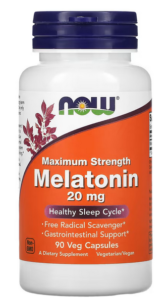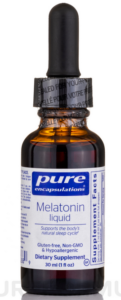Melatonin is one of the most commonly used supplements for sleep. Almost anyone I talk to who has dealt with insomnia has tried melatonin at some point. Sometimes with success. But more often than not it works poorly, or does not even do anything at all.
The available research studies show conflicting results as well. For example this meta-analysis on melatonin covers many studies, using different doses for jet lag, shift work, and improving sleep in otherwise healthy adults. The results are confusing, as some studies are very positive, and others don’t show much benefit. [1]
Drug, hormone or supplement?
Perhaps the problem is with the way people think about melatonin. It is not a pharmaceutical sleeping pill that drugs people to sleep. Melatonin is a hormone, which the body needs in specific amounts at the right time to initiate sleep. Like any other hormone, we need just the right amount. More is not necessarily better.
Usually people take melatonin supplements as they would a prescribed sleeping pill. At night, before bed. Some clients have told me this works very well for them. Usually it helps very little, or not at all.
Melatonin is also now being sold in doses as high as 10 – 20mg. These supra physiological doses were initially used for inflammatory health conditions, particularly cancer. They were not intended for insomnia. However, the supplement market being how it is, 20mg melatonin is now being sold for sleep. In reviewing the current research for this article, I could find nothing supporting the use of such high doses of melatonin for insomnia.

Regardless if it is a 3mg or 20mg pill before bed, these doses and timing of melatonin supplements often do no work well for sleep.
Sleep hygiene for melatonin
Another way people try to regulate melatonin in through sleep hygiene rituals, such as not looking at screens at night, wearing orange glasses to block out blue light. There are even black curtains some people use to seal off all light from entering their room. All this to promote the pineal gland’s natural release of melatonin.
Sometime these sleep strategies work. If you find them helpful, then go ahead and continue doing them. But just like taking a high dose melatonin pill at night, sleep hygiene rituals often don’t work. Nor does shutting off all the lights, computers and forcing yourself to sleep at an early time. At worst, sleep hygeine out of context creates it’s own problem. The stress from doing this may paradoxically make sleep even worse!
The Sleep Hormones, a very brief review
Melatonin is actually just one of several sleep hormones. The main job of melatonin is to regulate the circadian rhythm.
Sleep drive is regulated by another hormone, adenosine. The longer you are awake, the higher adenosine goes. When it gets high enough, it triggers sleep. Once of the reasons why it can be bad to take extended naps is that lowers adrenosine. Then at night when it’s time to go to sleep, you make not have enough adenosine to fall alseep.
There are only two way s we know of to raise adenosine: staying asleep longer, and exercise. One of the ways caffeine keeps people awake is by inhibiting adenosine.
Another hormone important for sleep is cortisol. This is our major stress hormone. It normally goes down at night, and then rises in the morning to help wake us up. Stress raises cortisol and this can lead to poor sleep.
Getting the hormones to work in sync with each other
So why may someone be very tired at night, but can’t fall asleep? Adenosine is slowly going up, making you sleepy. But if melatonin is too low, or cortisol too high, the sleep process isnt’ initiated. You lay down to fall asleep but can not. The mind is suddenly active with racing thoughts. This is feeling "tired but wired." Too exhausted to be up and active, but unable to sleep, even feeling even agitated once you go to bed.
How to use melatonin
Supplemental melatonin for sleep, should be used as an aid to get melatonin and the circadian rhythm in sync with the other sleep hormones.
Melatonin is not a sleeping pill like ambiem. For most people it’s not going to enter your bloodstream and knock you out. The key may be a small, physiological dose of melatonin several hours before bed to gently reset the circadium rhythm to help people fall asleep.
The easiest way to dose low dose melatonin is with a liquid supplement. This way you can find the right number of drops that work for you.
Typical supplement dose
2 to 5mg. Sold as high as 20mg.
Actual physiological dose0.3 up to 1.0mg. [2]

My personal experience with sleep
Due to stress and lifestyle I through off my cirrcadium rrythm when I started college. For over 20 years nothing I did helped. And this includes anything I learned in naturopathic school and seeing different practitioners. I tried many of the the sleep supplements and sleep hygeine tips. It didn’t matter. No matter how little I slept I could not fall asleep until about 3 AM. Sometimes 4AM, or later.
This included a 3 year stretch when I was a mail carrier and at times had to be in to work at 7:30 AM. Months of working that job left me feeling like an exhausted zombie. My body never adjusted to waking up that early.
And yes, I tried melatonin. Many times. it didn’t work. In fact, it was the first thing I tried to fix my insomnia. Every few years I’d try it again. I tried up to 10mg, with absolutely no noticeable effect.
Finally I tried something different. A liquid melatonin which would allow me to take a very low dose melatonin. I didn’t take it before bed. Instead I took it 4 hours before I wanted to go to sleep. After a few days the melatonin was working so well that I was sleeping 10:00 to 4:30 AM!
At times I’ve used other products for sleep that would work a day or two and then stop. But the melatonin kept working for weeks, and then months, without ever stopping.
I’m not saying that everyone who can’t fall asleep needs melatonin. Also, it would be good to have some studies that used melatonin in low doses, and not right before bed, but those just simply have not been done. We do have these studies from 1999 and 2001 showing melatonin working well with doses as low as .3mg. [2, 3]
Blackout curtains and light box
Another way to to reset cirrcadium rhythem is through light. Blackout curtains around the windows at nigh, and shutting off electronic devices will promote the body’s natural production of melatonin.
A light-box, timed to go off in the morning will tell the body when to wake up.
If following this method, I recommend that these be done together. The blackout curtains may help to promote sleep at night, but then the body needs a light cue to learn when to wake up. If you state in total darkness, that won’t happen.
In theory, this system is more align with a truly natural approach. The blackout curtains and light-box simulate a day / night cycle we are designed to live in.
The problems with doing this is the expense of buy the material, and added stress of adding these to a daily routine. Supplemental melatonin is a step away from this more $quot;natural$quot; approach. However, considering how much more practical it is take melatonin, for many people this is going to be the better option.
Is melatonin for everyone?
There are numerous reaons why someone may not be able to fall asleep. Melatonin is not a panacea, nor should it be used for everyone. For some people who can not fall asleep due to a circadian rhythm problem, melatonin may be very helpful.
References
[1] https://www.ncbi.nlm.nih.gov/pmc/articles/PMC4273450/